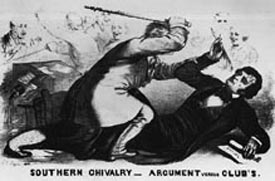ALL YOU HAVE TO DO SIR IS HAND OUT ENOUGH NEW CANES
 Olbermann’s Special Comment : There is no line this President has not crossed — nor will not cross — to keep one political party, in power.
Olbermann’s Special Comment : There is no line this President has not crossed — nor will not cross — to keep one political party, in power.Mike Sheehan and David EdwardsPublished: Thursday November 2, 2006
On MSNBC's Countdown, Keith Olbermann remarks in his trademark "Special Comment" on the absurdity of the Bush administration's attacks on Sen. John Kerry, under fire for remarks construed by Republicans as an insult to American troops.
Olbermann recalls the violent 1856 caning by Rep. Preston Brooks of South Carolina on the vociferous, anti-slavery Sen. Charles Sumner of Massachusetts which disabled the senator for three years and was one of the memorable events leading up to the Civil War. In support, Brooks' constituents sent him new canes; drawing a parallel, Olbermann remarks, "We almost wonder to whom President Bush will send the next 'new cane.'"
Watch Video
 1851-1877
1851-1877
May 22, 1856
The Caning of Senator Charles Sumner
Caning of Sumner (NY Public Library)
On May 22, 1856, the "world's greatest deliberative body" became a combat zone. In one of the most dramatic and deeply ominous moments in the Senate's entire history, a member of the House of Representatives entered the Senate chamber and savagely beat a senator into unconsciousness.
The inspiration for this clash came three days earlier when Senator Charles Sumner, a Massachusetts antislavery Republican, addressed the Senate on the explosive issue of whether Kansas should be admitted to the Union as a slave state or a free state. In his "Crime Against Kansas" speech, Sumner identified two Democratic senators as the principal culprits in this crime—Stephen Douglas of Illinois and Andrew Butler of South Carolina. He characterized Douglas to his face as a "noise-some, squat, and nameless animal . . . not a proper model for an American senator." Andrew Butler, who was not present, received more elaborate treatment. Mocking the South Carolina senator's stance as a man of chivalry, the Massachusetts senator charged him with taking "a mistress . . . who, though ugly to others, is always lovely to him; though polluted in the sight of the world, is chaste in his sight—I mean," added Sumner, "the harlot, Slavery."
Representative Preston Brooks was Butler's South Carolina kinsman. If he had believed Sumner to be a gentleman, he might have challenged him to a duel. Instead, he chose a light cane of the type used to discipline unruly dogs. Shortly after the Senate had adjourned for the day, Brooks entered the old chamber, where he found Sumner busily attaching his postal frank to copies of his "Crime Against Kansas" speech.
Moving quickly, Brooks slammed his metal-topped cane onto the unsuspecting Sumner's head. As Brooks struck again and again, Sumner rose and lurched blindly about the chamber, futilely attempting to protect himself. After a very long minute, it ended.
Bleeding profusely, Sumner was carried away. Brooks walked calmly out of the chamber without being detained by the stunned onlookers. Overnight, both men became heroes in their respective regions.
Surviving a House censure resolution, Brooks resigned, was immediately reelected, and soon thereafter died at age 37. Sumner recovered slowly and returned to the Senate, where he remained for another 18 years. The nation, suffering from the breakdown of reasoned discourse that this event symbolized, tumbled onward toward the catastrophe of civil war.
Reference Items:
Donald, David. Charles Sumner and the Rights of Man. New York, Knopf, 1970.
Potter, David M. The Impending Crisis: 1848-1861. New York: Harper & Row, 1976.




0 Comments:
Post a Comment
<< Home